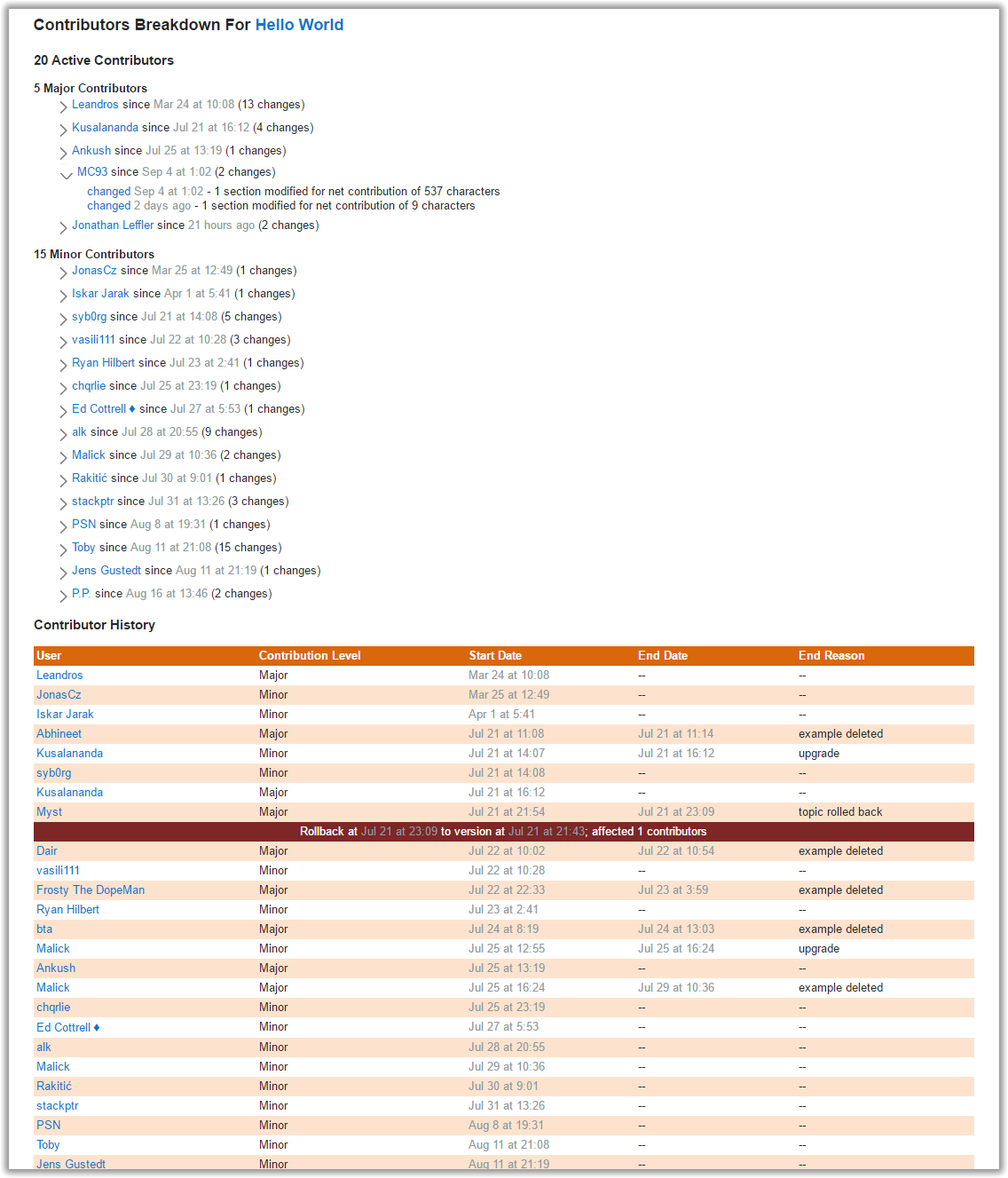TL;DR
Noticed your rep change? It’s because we’re deploying an update to the rep in the Documentation Beta as was announced a couple weeks ago. The biggest change: there is now a “minor” contributor level where example upvotes give you +1 instead of +5.
Read on for the nitty gritty of how Documentation rep now works:
Gaining Reputation
- Whenever a change is approved, the author receives +2 reputation, unless...
- They were the last editor to all the topics modified in that change or
- The change rolls a topic (or topic(s)) back to a previous state
- If an answer cites a topic or example, and that answer is upvoted each contributor gets a one-time +5
- A user is considered a contributor if they have ever net added 20 or more characters to the topic or example (more on contributors below)
- This only happens once per answer-user-pair, multiple links do not stack
- This only happens on the first upvote after a documentation link has been added, no user can gain more than +5 reputation per-answer from Documentation
- Whenever an example is upvoted, major contributors to the example get +5 reputation and minor contributors get +1 reputation
- Minor contributors are everyone who has added at least 20 characters to an example as part of a single change
- Major contributors are the creator of the example plus everyone who has added at least 350 characters to an example
- The 350 characters may be split across several changes, provided that each change adds at least 20 characters
Losing Reputation
- If the topic(s) affected by a change are rolled back to before it was applied, the +2 from approval is removed
- If the answer upvote is reversed, the answer is deleted, or the documentation link is edited out then the +5 from citation is removed
- If the example upvote is reversed, the example or topic is deleted, or the contributions the user made are rolled back then the +1 or +5 is removed
- If enough contributions are rolled back so that a user is no longer a major contributor but is still a minor contributor, the +5 is instead converted to a +1
In keeping with Q&A, if the reputation has been live for 60 or more days it is “locked in” and future deletions, removals, or rollbacks will not affect it.
Frequently Asked Questions
- Q: How are characters counted for minor and major contributor status?
- A: Whitespace and formatting are removed and a per-character diff calculated. The number of characters contributed is: <# of characters added> - <# of characters removed>
- Q: Why can’t deletion make you a contributor?
- A: We found through manual evaluation of the data that while most deletes improve content, they do not improve it as much as the typical addition. Accordingly the one-time +2 rep reward from their deletion being approved felt like an adequate and appropriate reward.
- Q: Why do changes have to be 20 or more characters to affect contributor status?
- A: Many of the changes smaller than 20 characters are minor cleanups (spelling, punctuation, etc.) which, like deletion, feel adequately rewarded by the +2 on approval. They do not “stack up to” contributor status because it doesn’t make sense for repeated spelling or punctuation improvements to ever equal more substantive additions.
- Q: Why 350 characters to be a major contributor?
- A: This number is about 3/4ths the typical size of the initial revision of an example. We believe adding this amount of content to existing examples is about equal to the effort that creators put in, and is thus worth the same potential reward.
- Q: Am I still considered a contributor to a topic if my example is deleted?
- A: If your only contribution to a topic is through the deleted example, you will no longer be considered a contributor. Whether that impacts your reputation depends on how old the rep gained from the example is, as detailed above.
- Q: What happens when an example is moved?
- A: You may lose your contributor status to the previous topic the example was on, and may gain it on the new topic, depending on your other contributions to those topics. Moving an example is not treated like a deletion, so you will not lose reputation.
- Q: What happens if someone upvotes an example they’ve contributed to? Or upvotes an answer that cites one of their topics?
- A: A user can never give themselves reputation. Upvoting an example you’ve contributed to (or an answer that cites Documentation you’ve contributed to) may reward other users, but never yourself.
- Q: What rep is subject to the daily rep cap?
- A: All reputation except the +2 from approval is subject to the daily rep cap.
Inspecting Contributors
There’s a a dev-y page that shows a bunch of detail about topic and example contributors. You can find this page at /documentation/contributors/topic/{id} and /documentation/contributors/example/{id}.
Example link for the C Hello World topic, and one for the Original “Hello World!” in K&R C example.
The top two sections show all the current contributors to the topic or example, and include links to all the changes they have made. These changes include those that did not affect their contributor status, and are meant to give the full context of their contributions.
The table includes everybody who has ever been considered a contributor, the dates and levels of their contributions, and if their contribution ended why it ended.
We’re exposing these details to make it easier for folks to help us find bugs and edge cases in the reputation system.

How to use console.log()!!